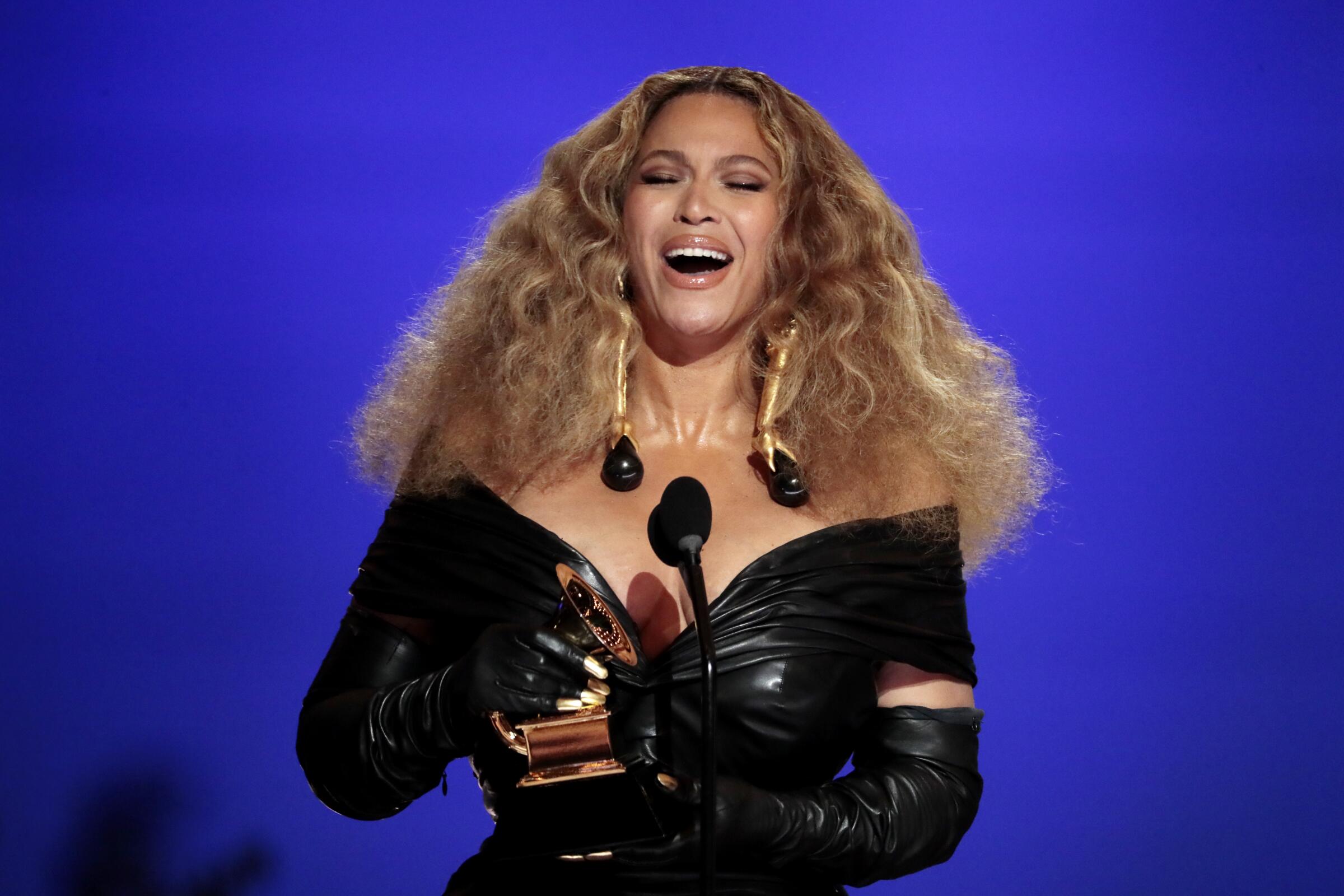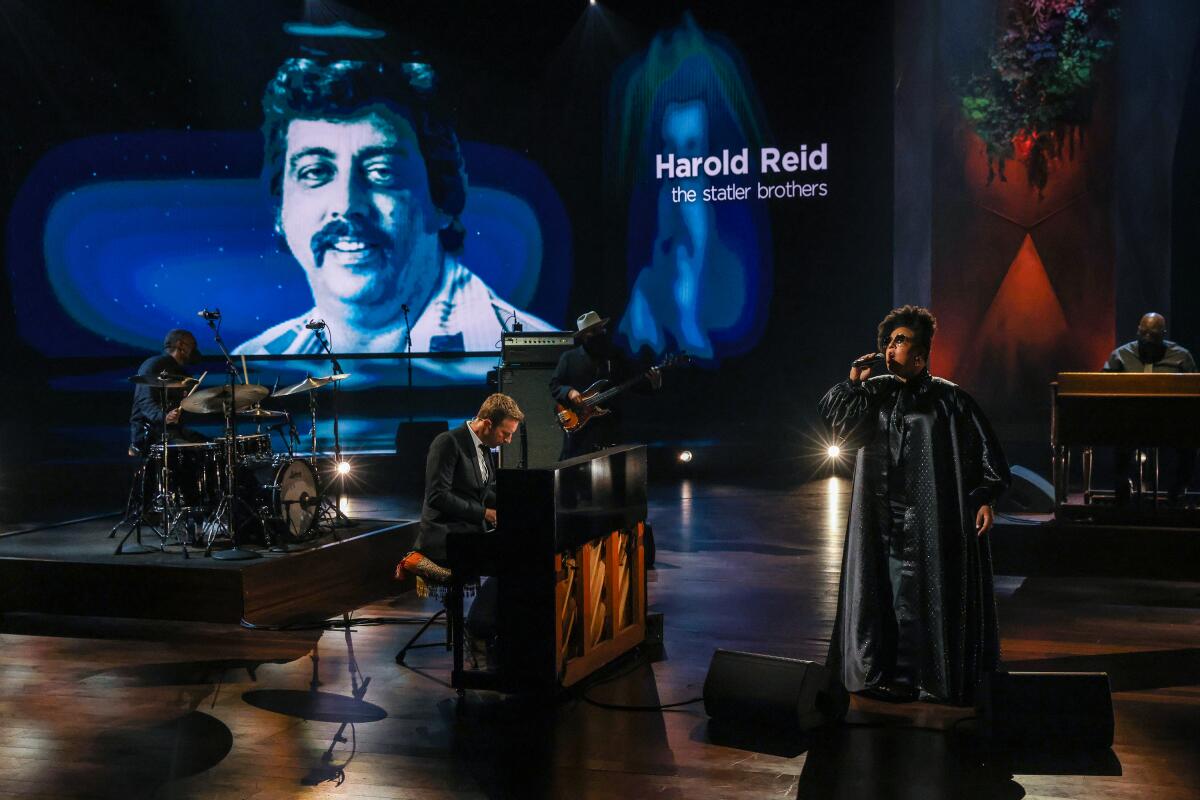The biggest entertainment stories
Get our big stories about Hollywood, film, television, music, arts, culture and more right in your inbox as soon as they publish.
You may occasionally receive promotional content from the Los Angeles Times.

The most exciting moment of Sunday night’s 63rd Grammy Awards ceremony didn’t come in a performance or when a presenter announced who had won a coveted prize.
It arrived maybe halfway through the nearly four-hour telecast as one of CBS’ cameras passed over the audience — or what passed for one at this socially distanced version of music’s most prestigious awards show — to reveal that Beyoncé and Jay-Z had actually shown up to grace the Grammys with their presence.
Sure, Beyoncé was the night’s most-nominated act, with nine including nods for record and song of the year. But anyone who knows anything about the singer knows about her tortured history with the Grammys, which over two decades have showered 79 nominations on her — and given her only a single major award, for song of the year with “Single Ladies (Put a Ring On It)” in 2010.
Women, and particularly Black women, dominated Sunday’s COVID-impacted Grammy Awards, as Beyonce, H.E.R., Taylor Swift and Megan Thee Stallion won big prizes.
Indeed, the dodgy history is such that Beyoncé opted not to perform at this year’s ceremony, which was held both inside and outside the Los Angeles Convention Center to comply with COVID-19 safety guidelines.
So seeing her in the flesh — impossibly cool behind a face mask and a pair of stylish shades — made you wonder if perhaps she’d gotten some inside word from the Recording Academy that this year the big prizes were finally hers.
Nope.
Beyoncé lost the song and record awards — both nominations were for her song “Black Parade,” which she released on Juneteenth amid last summer’s nationwide racial-justice protests — to thoroughly unexpected winners: H.E.R.’s “I Can’t Breathe” for song of the year and Billie Eilish’s “Everything I Wanted” for record of the year.
It was one more indication of the academy’s famously iffy relationship with artists — especially artists of color — at pop’s creative vanguard. (One act who went into Sunday’s show knowing he wouldn’t win any big awards? The Weeknd, who was somehow overlooked for a single nomination despite having one of 2020’s biggest albums and singles — and subsequently announced that he’d told his record label not to submit his future work for Grammys consideration.)

Marquee losses aside, Beyoncé didn’t exactly have a bad night on Sunday: With smaller-category wins for music video, R&B performance, rap performance and rap song, she set a new record for the most Grammys ever won by a female artist — and the most for any singer, male or female — pushing past Alison Krauss’ 27 to 28.
But that kind of statistic felt like a fait accompli for an artist as impactful as Beyoncé; you knew she’d get there eventually. What’s still missing is the academy’s aligning the history books — as embodied in the big awards that people remember — with the dimensions of her career.
Beyoncé wasn’t the only woman who set a record at the Grammys. With her third win for album of the year, in this case for the rootsy “Folklore,” Taylor Swift is now the first woman to take the show’s flagship category three times — as many as Frank Sinatra, Stevie Wonder and Paul Simon.
Accepting the award on Sunday, she called attention to the fact that she’d made the LP remotely while in quarantine, telling one of her collaborators, Bon Iver’s Justin Vernon, “I’m so excited to meet you someday.”
But as with Beyoncé’s new title, Swift’s album win seemed almost preordained: After a pair of albums that Grammy voters didn’t care for, “Folklore” reemphasized Swift’s songwriting chops and her love of hand-played textures — precisely the values the academy has long enshrined.
The night’s remaining major prize, best new artist, went to Megan Thee Stallion, the Houston rapper who joined forces with Cardi B during the show for a delightfully bawdy performance of their raunch-a-thon duet “WAP.” Megan’s win raised hopes that voters are moving closer toward rewarding music that doesn’t merely reiterate past Grammy glories (as in the case of Eilish’s pleasant but deeply inessential “Everything I Wanted”).

The other reason Beyoncé’s sighting carried such a welcome charge — at least before cold reality set in — was because this show was a pretty sedate affair. With no audience of fans in Staples Center to perform for, artists did their thing one at a time on a set of interconnected stages with other performers as spectators.
Occasionally the COVID-compliant scheme — devised by executive producer Ben Winston, who took over the Grammys this year after four decades with TV veteran Ken Ehrlich at the helm — paid off, as when Bad Bunny could be seen, following his vivid rendition of “Dákiti,” nodding his head appreciatively as the night’s next performer, Dua Lipa, did her disco-throwback smash “Don’t Start Now” as a kind of Studio 54 fever dream. The academy is always talking about building community among musicians; this was a living example.
With host Trevor Noah at the helm, Sunday’s telecast proved less is more as the COVID-19 pandemic forced a shakeup — and breathed new life into the form.
Harry Styles, whose “Watermelon Sugar” was named best pop solo performance, gave a winningly low-key rendition of that song that made expert use of a crack live band (and of Styles’ ample sex appeal). Haim, the beloved L.A. sister trio, sounded far more like a real-deal rock band than acts usually sound on TV.
And though many of the performances were live, Winston’s choice to prerecord some, ostensibly to cut down on backstage interactions, let the young Atlanta rapper Lil Baby turn “The Bigger Picture” into an elaborate production number about police violence and gave Bruno Mars and Anderson .Paak the chance to indulge in all kinds of flashy “Soul Train”-style camera tricks to go along with “Leave the Door Open,” a bit of shameless Chi-Lites cosplay to introduce their new duo Silk Sonic.
Mars and .Paak showed up again during an extended “In Memoriam” sequence — they toasted Little Richard with the required wit and finesse — that also had Lionel Richie paying tribute to his old friend Kenny Rogers with a tender “Lady,” Brandi Carlile singing John Prine’s “I Remember Everything” and Brittany Howard and Chris Martin turning “You’ll Never Walk Alone” (as popularized by the late Gerry Marsden) into a kind of avant-gospel experiment.
After a year filled with farewells for so many, slowing down an already-slow show for these goodbyes made plenty of sense. But it also reminded you that the Grammys love nothing more than yesterday.
The biggest entertainment stories
Get our big stories about Hollywood, film, television, music, arts, culture and more right in your inbox as soon as they publish.
You may occasionally receive promotional content from the Los Angeles Times.